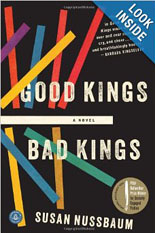Rewriting images of people with disabilities
by Beth
Back in 2010, I was asked to perform in a cabaret show that a Chicago disability organization called Access Living was putting on. The majority of people on staff at Access Living have disabilities, most of their board members have disabilities, and every single person in that 2010 cabaret show had a disability. I read an excerpt from my memoir Long Time, No See, and the other talented folks on stage sang, danced, played music, performed skits and did comedy acts.
One of the highlights of that evening for me was being introduced to disability rights advocate Susan Nussbaum, the emcee for the evening. Susan was still working at Access Living back then, but she’d also started doing some writing. Before the show she and I had a chance to share ideas and compare stories about our writing lives, and two short years later, in 2012, her first novel Good Kings Bad Kings was published.
Susan was in a bad car accident in the 1970s and has been using a wheelchair ever since. She told me that while she was recuperating from that accident, she’d tried to think of characters with disabilities in books she’d read, thinking those characters might give her some examples of how to live her new life. In the end, she discovered that characters with disabilities in literature were over-the-top inspirational, super-heroic, or terribly bitter. And so, she decided to write a novel of her own with characters who have disabilities and were human, too.
Good Kings Bad Kings takes place in a fictional Chicago center for young people with physical and mental disabilities. It tells their stories from multiple points of view: not only those of residents, but also those of workers.
You can imagine what a treat it was to switch on the radio on Christmas Eve last month and catch Susan Nussbaum being interviewed on NPR’s Here & Now. In the interview, Susan said the images from those books she read shortly after her accident made her feel as if she should be ashamed that she’d have to do things differently now. “I wanted to see characters that were different than anything that I was able to see anywhere else, disabled characters that were recognizable as human beings.”
I especially liked the way she emphasized that most of us with disabilities really don’t think about our disability as often as average people think we do. That’s why the characters in Good Kings Bad Kings don’t think about their disabilities, either—Susan only mentions a character’s disability when she needs to do it for a bit of exposition.
Susan Nussbaum says the reason you don’t see more authenticity in the way disabled characters are represented culturally is that there are too few fiction writers with disabilities. Good Kings Bad Kings won the 2012 Pen/Bellweather Prize for Socially Engaged Fiction, and it was recently released in paperback. I’m hoping Susan Nussbaum’s success with Good Kings Bad Kings will encourage more people with disabilities to give writing a try.








January 17th, 2014 at 9:07 pm
I’m a 8 year survivor of Multiple Sclerosis, im trying to find help. Having this disability i don’t know if you work with or adult on set disabilitiesd.I have tryed the M.S. society, and my need may seem weird but it isn’t to me.. I’m in desperate need of a car.I’m on disability , bbt i have tons of drs appt, trying to go back to school to work on a career i can doatleast pt. Can anyone tell me about grants, or what to do. im a mom on a low budjet trying& praying what to do. This is embarassing but don’tno what to do? Thank you for any direction u can give me. Sincerely Trish
January 15th, 2014 at 10:36 pm
i,m very pleased with your programe so much that we must get intourch so soon,as amember of the langata desabled group,ido hope there is alort we are going to share and exchange please thank you,from joseph nyalik maguti,general secretary langata desabled selp help group